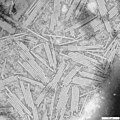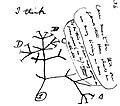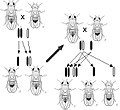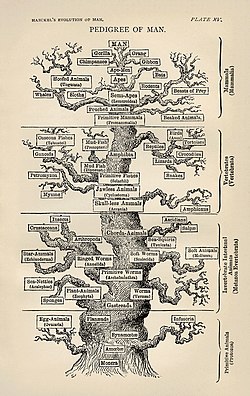Portal:Biology
Introduction


Biology is the scientific study of life. It is a natural science with a broad scope but has several unifying themes that tie it together as a single, coherent field. For instance, all organisms are composed of at least one cell that processes hereditary information encoded in genes, which can be transmitted to future generations. Another major theme is evolution, which explains the unity and diversity of life. Energy processing is also important to life as it allows organisms to move, grow, and reproduce. Finally, all organisms can regulate their own internal environments.
Biologists can study life at multiple levels of organization, from the molecular biology of a cell to the anatomy and physiology of plants and animals, and the evolution of populations. Hence, there are multiple subdisciplines within biology, each defined by the nature of their research questions and the tools that they use. Like other scientists, biologists use the scientific method to make observations, pose questions, generate hypotheses, perform experiments, and form conclusions about the world around them.
Life on Earth, which emerged over 3.7 billion years ago, is immensely diverse. Biologists have sought to study and classify the various life form, from prokaryotic organisms such as archaea and bacteria to eukaryotic organisms such as protists, fungi, plants, and animals. These organisms contribute to the biodiversity of an ecosystem, where they play specialized roles in the cycling of nutrients and energy through their biophysical environment. (Full article...)
Selected article -
A species (pl. species) is often defined as the largest group of organisms in which any two individuals of the appropriate sexes or mating types can produce fertile offspring, typically by sexual reproduction. It is the basic unit of classification and a taxonomic rank of an organism, as well as a unit of biodiversity. Other ways of defining species include their karyotype, DNA sequence, morphology, behaviour, or ecological niche. In addition, palaeontologists use the concept of the chronospecies since fossil reproduction cannot be examined. The most recent rigorous estimate for the total number of species of eukaryotes is between 8 and 8.7 million. About 14% of these had been described by 2011. All species (except viruses) are given a two-part name, a "binomen". The first part of a binomen is the name of a genus to which the species belongs. The second part is called the specific name or the specific epithet (in botanical nomenclature, also sometimes in zoological nomenclature). For example, Boa constrictor is one of the species of the genus Boa, with constrictor being the specific name.
While the definitions given above may seem adequate at first glance, when looked at more closely they represent problematic species concepts. For example, the boundaries between closely related species become unclear with hybridisation, in a species complex of hundreds of similar microspecies, and in a ring species. Also, among organisms that reproduce only asexually, the concept of a reproductive species breaks down, and each clonal lineage is potentially a microspecies. Although none of these are entirely satisfactory definitions, and while the concept of species may not be a perfect model of life, it is still a useful tool to scientists and conservationists for studying life on Earth, regardless of the theoretical difficulties. If species were fixed and distinct from one another, there would be no problem, but evolutionary processes cause species to change. This obliges taxonomists to decide, for example, when enough change has occurred to declare that a fossil lineage should be divided into multiple chronospecies, or when populations have diverged to have enough distinct character states to be described as cladistic species. (Full article...)
Selected picture -
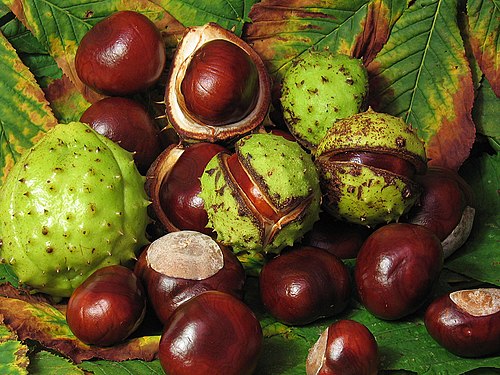
Major topics
Selected biography -

Jean Léopold Nicolas Frédéric, baron Cuvier (23 August 1769 – 13 May 1832), known as Georges Cuvier (/ˈkjuːvieɪ/; French: [ʒɔʁʒ(ə) kyvje]), was a French naturalist and zoologist, sometimes referred to as the "founding father of paleontology". Cuvier was a major figure in natural sciences research in the early 19th century and was instrumental in establishing the fields of comparative anatomy and paleontology through his work in comparing living animals with fossils.
Cuvier's work is considered the foundation of vertebrate paleontology, and he expanded Linnaean taxonomy by grouping classes into phyla and incorporating both fossils and living species into the classification. Cuvier is also known for establishing extinction as a fact—at the time, extinction was considered by many of Cuvier's contemporaries to be merely controversial speculation. In his Essay on the Theory of the Earth (1813) Cuvier proposed that now-extinct species had been wiped out by periodic catastrophic flooding events. In this way, Cuvier became the most influential proponent of catastrophism in geology in the early 19th century. His study of the strata of the Paris basin with Alexandre Brongniart established the basic principles of biostratigraphy. (Full article...)
General images -
Did you know -
- ... that endemics along the wildlife of Morocco include more than six hundred species of vascular plants and a single species of bird?
- ... that an extract of Alchemilla diademata, a plant endemic to Lebanon, shows antimicrobial activity against Staphylococcus aureus?
- ... that more than 5,000 hen fleas were recorded from the nest of a coal tit?
Things you can do
Related portals
Biology portals
Categories

Anatomy - Anthropology - Astrobiology - Biochemistry - Bioengineering - Bioinformatics - Biotechnology - Botany - Cell biology - Conservation biology - Developmental biology - Ecology - Environmental science - Evolutionary biology - Genetics - Mathematical biology - Medicine - Microbiology - Immunology - Molecular biology - Mycology - Neuroscience - Paleontology - Palynology Parasitology - Pharmacology -
Phylogenetics - Physiology - Systems biology - Taxonomy - Toxicology - Virology - ZoologyMore topics
WikiProjects

WikiProjects connected with biology:
A complete list of scientific WikiProjects can be found here. See also Wikispecies, a Wikimedia project dedicated to classification of biological species.
Associated Wikimedia
The following Wikimedia Foundation sister projects provide more on this subject:
-
Commons
Free media repository -
Wikibooks
Free textbooks and manuals -
Wikidata
Free knowledge base -
Wikinews
Free-content news -
Wikiquote
Collection of quotations -
Wikisource
Free-content library -
Wikiversity
Free learning tools -
Wiktionary
Dictionary and thesaurus


